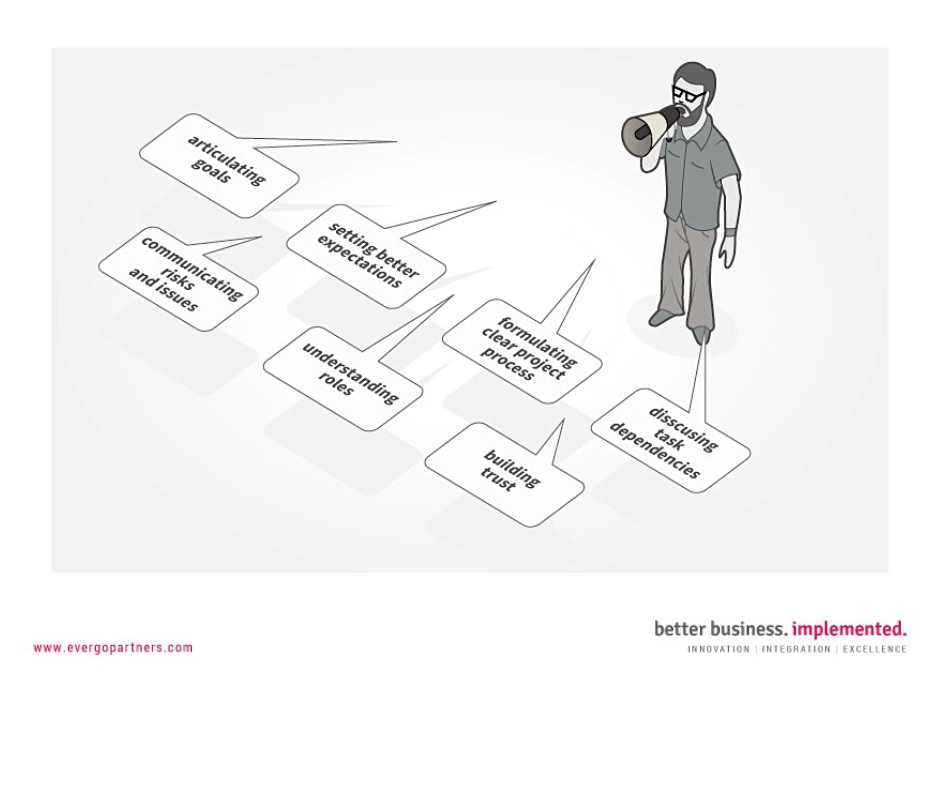Introduction
Could you imagine managing a project without any communication? You know it’s impossible, but did you really know how to communicate in a project to make a project successful? To be a successful project manager you have to use your communication skills first, then – the tools second. This article will be all about the communication skills.
As a project manager, it is your job to keep a number of people well informed.
The key to success is that your project team knows:
- What is expected of them
- What they must do
- When they must do it
- What are the budget constraints
- What are the time constraints
- What is the quality expectation.

Let’s talk about your task!
Project expectations
First of all your project team and stakeholders should know what is expected from them and vice versa: what they expect from you as a project manager. This can be done in few different ways: you can discuss your project goals and plan, you can make a map of project as a chart, you can communicate with your team via Skype, mail, telephone …but: you must put the details on the table and find answer for a very important question: what is the definition of success and how we might fail on this project? Speak about roles, tasks and risks. When you can see the risks, you can avoid them.
Build the trust
Good project communication starts with building trust with your team, and that is usually done through forming relationships with the team and stakeholders. It is important to have conversations that not only focus on the project but also some personal aspects of life in general. Try to make time to interact with the team about non-project things. Just: get personal. Tell jokes. Have some fun. Talk about your interests, your home life, your travels or about music which you like—anything that will help you to find common ground with your team. When they trust you they’re going to help you deliver a successful project. It is also easier to ask for things, it helps with difficult conversations, and guides the project to success.
Discuss deliverables
When you’re making your plan, you must be sure that you work in some time for team deliverables review. Just: sit down and discuss or even critique your team’s deliverables. This keeps team members accountable for project decisions throughout the life of the project, even if they’re not responsible for those items at present time. In this way, you’re eliminating the risk that a current deliverable may have a negative impact on your scope later in the project. Remember it is worth your time.
Conduct status
Status meeting are necessary. You cannot miss them. You can put them in your calendar every day or every two days or once a week. The key is you cannot cancel them or miss them without very good reason You’ll want to do that with your stakeholders as well to ensure that they’re seeing progress and know where they fit in the process. Status meetings will provide you current information about the progress of the project. You can find the risks, problems and solutions.
There are no stupid questions
To make a project successful you have to understand every piece of that process and keep your team informed about progress and process. You must remember about personal differences. Sometimes you have to work in an international, multicultural team. Make sure that you understand each other very well. Do not be afraid about asking questions. The more you understand the work that has to be done, the easier it is for you to advocate for it with stakeholders. It will be helpful to plan similar activities in the future projects.
Summary:
To have a good communication in a project you must remember about:
- Articulating project goals;
- Setting clear expectations about those goals and how you’ll meet them;
- Formulating project process that works for everyone;
- Discussing task dependencies and how you’ll meet them;
- Communicate risks and issues—and solve them;
- Understand one another’s roles and our impact on the project;
- Build the trust in a team.
And the last important thing: do your job and have fun of it!




